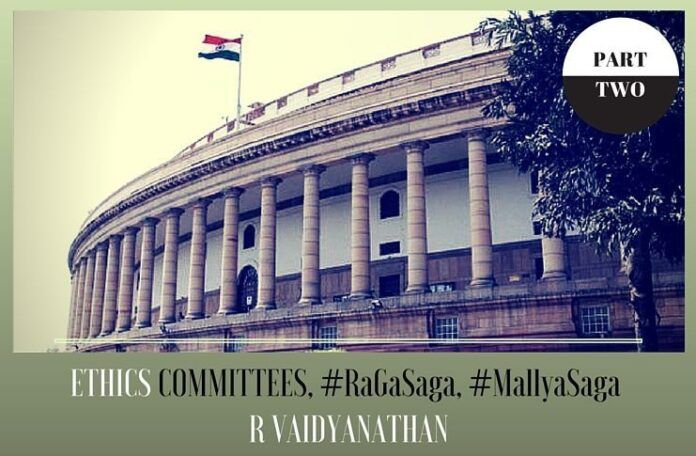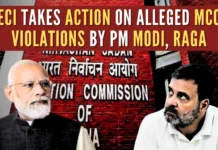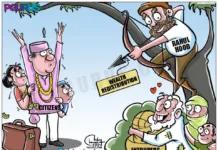
This is the second and concluding part of the article on Ehtics committee. For the first part, click here
We start out by listing the Framework of Code of Conduct for Members of Rajya Sabha (RS), as accepted by all parties – the report was submitted by S B Chavan in Dec 1998.
The Members of Rajya Sabha should acknowledge their responsibility to maintain the public trust reposed in them and should work diligently to discharge their mandate for the common good of the people. They must hold in high esteem the Constitution, the Law, Parliamentary Institutions and above all the general public. They should constantly strive to translate the ideals laid down in the Preamble to the Constitution into a reality. The following are the principles which they should abide by in their dealings:
Members must not do anything that brings disrepute to the Parliament and affects their credibility.
Members must utilise their position as Members of Parliament to advance general well-being of the people.
In their dealings if Members find that there is a conflict between their personal interests and the public trust which they hold, they should resolve such a conflict in a manner that their private interests are subordinated to the duty of their public office.
Members should always see that their private financial interests and those of the members of their immediate family do not come in conflict with the public interest and if any such conflict ever arises, they should try to resolve such a conflict in a manner that the public interest is not jeopardized.
Members should never expect or accept any fee, remuneration or benefit for a vote given or not given by them on the floor of the House, for introducing a Bill, for moving a resolution or desisting from moving a resolution, putting a question or abstaining from asking a question or participating in the deliberations of the House or a Parliamentary Committee.
Members should not take a gift which may interfere with honest and impartial discharge of their official duties. They may, however, accept incidental gifts or inexpensive mementoes and customary hospitality.
Members holding public offices should use public resources in such a manner as may lead to public good.
If Members are in possession of a confidential information owing to their being Members of Parliament or Members of Parliamentary Committees, they should not disclose such information for advancing their personal interests.
Members should desist from giving certificates to individuals and institutions of which they have no personal knowledge and are not based on facts.
Members should not lend ready support to any cause of which they have no or little knowledge.
Members should not misuse the facilities and amenities made available to them.
Members should not be disrespectful to any religion and work for the promotion of secular values.
Members should keep uppermost in their mind the fundamental duties listed in part IVA of the Constitution.
Members are expected to maintain in high standards of morality, dignity, decency and values in public life.
[dropcap color=”#008040″ boxed=”yes” boxed_radius=”8px” class=”” id=””]W[/dropcap]hile the Rajya Sabha does provide for the maintenance of members register of interest, it mandates disclosure only in five categories as opposed to global standards of at least ten. Besides, the registry is not open to public by default.
Kindly note that this is applicable only to members of RS. One is not sure if all RS members are acting as per these guidelines and if ethics committee under Karan Singh is monitoring it.
Lok Sabha(LS) does not maintain a list of complaints or enquiries, nor does the Rajya Sabha. This either means that there is poor data management and disclosure or that no complaints have been made to the ethics committees nor have cases been taken up suo motu. This despite the fact that several clear conflicts of interests exist between members’ private interests and parliamentary functions as this News laundry report shows.
[dropcap color=”#008040″ boxed=”yes” boxed_radius=”8px” class=”” id=””]F[/dropcap]or instance Abhishek Manu Singhvi, leader of the Congress party – represented and appeared for Dow Chemicals in 2006 (the company that bought over Union Carbide India Limited, or UCIL) —when UPA government was deciding about relief packages to affected victims.
Hema Malini wanted a tax cut for water purifiers when she was endorsing Kent Water purifiers. The examples are plenty…
This reveals that in Indian context there are only interests and no conflicts exist.
As earlier indicated Lok Sabha does not require its members to provide information to any registry. The ethics committee takes up the complaints as and when they arise.
A major issue awaits the deliberations and decision of the ethics committee of LS headed by L K Advani.
[dropcap color=”#008040″ boxed=”yes” boxed_radius=”8px” class=”” id=””]R[/dropcap]ahul Gandhi is alleged to have become a citizen of UK and also secretary of a company in that country. The papers pertaining to it have been published by Dr. Subramanian Swamy. The same has been submitted to ethics committee of LS by an LS member Mahesh Girri from Delhi. We wait with bated breath about the way this ethics committee headed by L K Advani is going to deal with this serious case.
We feel that transparency is the best disinfectant for many of these ethical issues.
Both houses of Parliament must keep registers for all members like in UK and it should be available on the net. The deliberations of the Ethics committee must be open to public and experts should be encouraged to give evidence/ their views.
As of now unfortunately our elected representatives are perceived as a bunch of self-seekers and treasury looters. After 70 years of our democracy we must take steps to rectify such perceptions and then alone younger generation will be less cynical and more respectful of our elected leaders.
- नकली खबर लक्षण है, बीमारी नहीं! - April 16, 2018
- Fake News/ Accreditation and Sedition - April 4, 2018
- Two Poisonous Seeds - March 15, 2018










